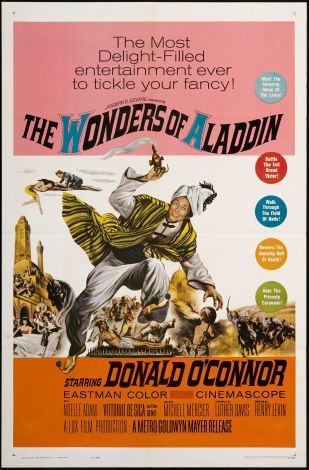There aren't too many "wonders" in The Wonders of Aladdin, but that doesn't mean it isn't a fun movie -- it's just not the movie that some people might expect with a title like that. Most of its appeal lies in its light-hearted, tongue-in-cheek approach to its subject (and has anyone been able to do any of this with even the slightest hint of seriousness since Alexander Korda's 1940 Thief of Bagdad?); that tone, coupled with the performance of the perennially youthful Donald O'Connor, who is a decade too old for his role but still manages to pull it off, keep things moving in a cheerful if not always smooth manner. The problem is that while O'Connor is physically fine for the role, he lacks sufficient screen personality to keep the audience focused and fully involved on his character -- what the filmmakers really needed was Danny Kaye, a much more versatile performer, who was accustomed to satirical period roles such as this (i.e. The Court Jester, The Inspector General etc.); and, in fact, the movie apparently was originally conceived as a vehicle for Steve Reeves -- one imagines that there were major rewrites, and perhaps even a serious reconception of the script when Reeves failed to do the picture. O'Connor gives us what amounts to a dinner theater version of a light leading man performance, reminiscent in some ways of Paul Henried's work in The Spanish Main. Noelle Adam -- who bears a startling resemblance to Annette Funicello -- is pretty enough to look at, and Vittorio De Sica is a charmingly sardonic genie who, alas, isn't on the screen quite enough of the time. One more familiar face here is Mario Girotti as Prince Malouk, the traditionally heroic leading man -- he's better known by his later professional name, Terence Hill, and he brings considerable energy to all of his scenes. Although the film itself lists Henry Levin as the sole director, at least in US prints, Mario Bava -- who also handled the special effects and the second unit shooting -- is generally understood to have been the co-director. Some of the wonders that are here seem to have been borrowed at least as much from the less expensive array of magic depicted in Korda's Thief of Bagdad, as much as the thousand-and-one nights; and the division of the heroics here, between the impish Aladdin and the brave Prince Malouk, also recalls the Korda movie, although the two heroes never bond in friendship, so chaotic is the structure of this movie's narrative (and, in that sense, it is faithful the thousand-and-one nights as source material). The special effects are cheesy at best, even by the standards of 1961, but today that seems like part of the movie's charm, coupled with the light tone and the over-acting, especially by Milton Reid as Aladdin's servant Omar and Fausto Tozzi as the evil Grand Vizier. Michele Mercier makes a very pretty princess, and Raymond Bussieres -- who seems to have had the longest career of anyone in this picture -- is memorable as an aging magician who is constantly trying to stay on the Vizier's good side. The movie was shot in Technicolor and CinemaScope, but hasn't been seen in widescreen in decades -- but even in pan-and-scan presentations, it's undemanding fun, if taken in the right spirit.

The Wonders of Aladdin (1961)
Directed by Henry Levin / Mario Bava
Genres - Fantasy, Children's/Family |
Sub-Genres - Children's Fantasy, Slapstick |
Release Date - Dec 13, 1961 (USA) |
Run Time - 93 min. |
Countries - Italy |
MPAA Rating - NR
Share on